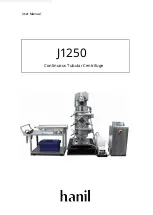
the battery. Check belts and connection from alternator to battery.
HIGH
– Charging Voltage is High – Voltage output from alternator to battery
exceeds the normal limit. Check alternator connections, including ground
connection. Also, check manufacturer specifications, as output requirement may
vary by vehicle type and manufacturer (confirm range is, in fact, too high for
vehicle).
9. Next, the tester will perform the Charging System Under Load Test, starting with
a Ripple Detect assessment. Press “ENTER” to begin this test sequence.
10. Turn on the following accessories: blower to high (heat), high beam headlights,
and rear defroster.
Note:
Do not use cyclical loads such as air conditioning or windshield wipers.
11.
Optional Step determined by the Tester:
When testing older model vehicles with
diesel engines, the tester may prompt the operator to run the engine at 2500
RPM for 15 seconds. Display will read: “RUN ENGINE UP TO 2500 RPM 15
SEC.”
12. Press “ENTER”. The tester will display the ripple detected from the charging
system to the battery and provide an assessment of that reading.
NORMAL RIPPLE DETECT
– Charging System OK
HIGH
– Excess Ripple Detected – One or more of the alternator diodes are not
functioning properly or there is other damage to the charging system. Check to
ensure alternator mounting is sturdy and that belts are in good condition and
functioning properly.
13. Press “ENTER” to proceed to the Charging System Under Loads Test. One of
three results will be displayed, along with the actual voltage reading.
NORMAL
– Charging System OK
LOW
– Charging Voltage is Low – Alternator is not providing sufficient current
for the system’s electrical loads and to charge the battery. Check belts and
connection from alternator to battery.
HIGH
– Charging Voltage is High – Voltage output from alternator to battery
exceeds the normal limit. Check alternator connections, including ground
connection. Also, check manufacturer specifications, as output may vary by
vehicle type and manufacturer.











































